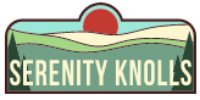





Founded
Occupancy
Accreditation
Who We Treat
Specializations
Levels of Care
About Serenity Knolls
Surrounded by hills and forest, Serenity Knolls is a private campus providing rustic cabins, 12-Step treatment approach, and a family program.
Accepted Insurances
Treatment
Levels of Care
Detox
Detox fully and safely removes toxic substances from the body, allowing the next steps in treatment to begin with a clean slate.
Residential
In a residential rehab program, patients live onsite, with access to daily treatment and 24-hour care. An average stay is 30-90 days.
Methods
Evidence-Based
A combination of scientifically rooted therapies and treatments make up evidence-based care, defined by their measured and proven results.
Individual Treatment
Individual care meets the needs of each patient, using personalized treatment to provide them the most relevant care and greatest chance of success.
1-on-1 Counseling
Patient and therapist meet 1-on-1 to work through difficult emotions and behavioral challenges in a personal, private setting.
Group Therapy
Two or more people meet with a therapist together. Patients get valuable peer support, strengthen interpersonal skills, and improve self-awareness.
Yoga
Yoga is both a physical and spiritual practice. It includes a flow of movement, breathing techniques, and meditation.
Family Therapy
Family therapy addresses group dynamics within a family system, with a focus on improving communication and interrupting unhealthy relationship patterns.
Twelve Step Facilitation
12-Step groups offer a framework for addiction recovery. Members commit to a higher power, recognize their issues, and support each other in the healing process.
Couples Counseling
Partners work to improve their communication patterns, using advice from their therapist to better their relationship and make healthy changes.
Twelve Step
Incorporating spirituality, community, and responsibility, 12-Step philosophies prioritize the guidance of a Higher Power and a continuation of 12-Step practices.
Medical
Medical addiction treatment uses approved medications to manage withdrawals and cravings, and to treat contributing mental health conditions.
Conditions We Treat
Alcohol
Dependence on alcohol for coping or excessive drinking indicates a disorder that can have serious health and social implications.
Benzodiazepines
Used for treating anxiety and sleep problems, benzodiazepines can be highly addictive, leading to mood swings and impaired judgement when abused.
Co-Occurring Disorders
When someone has both a mental health disorder and substance abuse issue, it is known as a dual diagnosis or co-occurring disorder.
Cocaine
Cocaine is a powerful stimulant that creates euphoria but can lead to severe health issues like heart problems and psychosis with prolonged use.
Drug Addiction
Substance addiction involves compulsive drug use despite adverse consequences, negatively affecting health, relationships, and daily life.
Ecstasy
Ecstasy, known for inducing intense euphoria and sensory enhancement, can lead to significant issues like insomnia and cognitive impairments when abused.
Heroin
Heroin, an illicit opioid, is highly addictive and can cause severe health issues such as heart problems, insomnia, and collapsed veins.
Methamphetamine
Methamphetamine increases energy and alertness but can cause severe mental and physical health issues, including paranoia and agitation, with long-term use.
Opioids
Opioids, which include prescription painkillers and heroin, can lead to addiction due to their pain-relieving and euphoric effects.
Prescription Drugs
Misuse of prescribed medications, driven by cravings or overuse, can lead to addiction, necessitating professional intervention.
Synthetic Drugs
Lab-made drugs, unlike natural ones, include stimulants and synthetic cannabinoids, which can have unpredictable and dangerous effects.
Psychedelics
Psychedelic drugs, such as LSD, alter perception and mood, but abuse can result in serious mental health issues like depression and psychosis.
Staff

Heather McCrea
Chief Executive Officer, MSW-t

